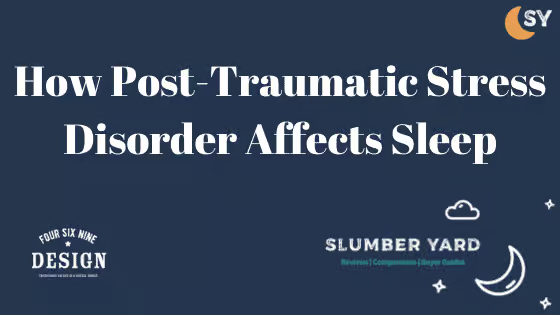*469 Design is very pleased and honored to be allowed to repost this blog about Post-Traumatic Stress Disorder provided by Slumber Yard.
Medically reviewed by Lauren Castiello, MS, AGNP-C
Lauren is a board-certified adult-gerontology primary care nurse practitioner. Lauren has done NP clinical practicums focusing on the adolescent, adult, and geriatric populations in internal medicine, long-term care, and in outpatient oncology/bone marrow transplant. Lauren received a BA from Assumption University, a BSN from Massachusetts College of Pharmacy and Health Sciences, and her MS in Nursing from the University of Massachusetts at Lowell. She is certified by the American Academy of Nurse Practitioners (AANP).

Post-traumatic stress disorder (PTSD) goes by many names, but fear, pain and restlessness are typically present no matter what you call it. Approximately 3.5% of American adults are affected by PTSD every year and one in eleven will receive a PTSD diagnosis in their lifetime.
According to the American Psychiatric Association, (PTSD) is a psychiatric disorder that may occur in those who have gone through or witnessed a traumatic event such as a natural disaster, a serious accident, a terrorist act, war/combat, or who have been threatened with violence. The events that trigger PTSD can fall in a wide range and are not limited to the list above; in fact, some may experience PTSD when a loved one experiences something traumatic.
PTSD can manifest itself in many forms, but these are some common symptoms of the disorder:
- Flashbacks or nightmares
- Feelings of sadness, fear, or anger
- Social detachment or estrangement
- Active avoidance of situations or people associated with the traumatic event
- Extreme sensitivity to loud noises, touch, or other upsetting stimuli reminiscent of the traumatic event
The recovery path for those with PTSD can be long and difficult, but emotionally processing the trauma in our lives is crucial to healing.
“Just as it takes time to reconstruct damaged buildings, it takes time to grieve and rebuild our lives,” says the Substance Abuse and Mental Health Services Administration (SAMHSA) for the U.S. Department of Health and Human Services. “No one who experiences a disaster is untouched by it. Profound sadness, grief, and anger are normal reactions to an abnormal event. Acknowledging our feelings helps us recover.”
For many, it can take a great deal of effort to recover from emotional trauma. What people may not realize is that insomnia is also a very common challenge in the recovery process. In fact, Brainline reports that 70% of people with PTSD also claim to be struggling with insomnia. Next, we’ll explore why PTSD can have such an impact on a person’s quality of sleep.
Sleep And PTSD
Traumatic nightmares and dreams are commonly associated with PTSD, and Verywell Mind reminds us that “children may have frightening dreams without content related to the trauma.”
For adults, however, it can be different.
Adults with PTSD are more prone to insomnia, whether sleep latency (the amount of time it takes to fall asleep) or remaining asleep. Studies show that insomnia is a hyperarousal symptom of PTSD and one of the very most common among people with PTSD.
It can wreak havoc on intended bedtimes, keeping you up for hours on end while the clock hands continue to slowly tick by without relief. Others may find sleep, only to relive their traumas over again in vivid nightmares of the traumatic event.
No matter how it affects you, if you’re not sleeping, it’s a major problem that needs to be addressed.
How Does PTSD Affect Sleep?
There are many culprits that could be to blame for poor sleep quality.
Whether it is falling asleep, staying asleep, or simply sleeping at night, PTSD can prevent sleep through any of these causes.
- Nightmares. Whether you relive the actual event or not, many people living with PTSD experience nightmares in their sleep. The U.S. Department of Veterans Affairs reports that of those with PTSD, up to 96% may experience nightmares.
- Hyperarousal. Even in the quiet of the night, you feel tense, anxious, and on edge. It’s hard for you to relax enough to find sleep because you keep reliving feelings or events associated with the traumatic event.
- Poor sleep cycle. When you are unable to sleep at night, it can be easier to grab a nap. Some people may only be able to find sleep during the day, which can throw off your sleep cycles and make it much harder to sleep at night.
- Sleep apnea. New studies show that those who have PTSD are also more likely to develop sleep apnea. This can be dangerous in some cases because it causes you to stop breathing temporarily in your sleep.
How Those With PTSD Can Get To Sleep
Medication-Free Ways To Get Sleep
When you have PTSD, it is especially important to find ways to fall asleep without the use of any potentially harmful substances.
There are many ways that you find sleep naturally without the use of any medications or drugs. These are some of our favorites.
- Set a schedule. It may take some time to train your body to adapt to this new routine, but over time, you may find that your body will slowly adjust as the new schedule is reinforced night after night. Following a set schedule at night will help set your body’s circadian rhythm and allow you to receive your daily recommended amount of sleep.
- Use a meditation app. Calming and meditation apps have become wildly popular in recent years and are an easy way to relax before bed. Just build a few extra minutes into your bedtime routine each night so you can breathe away the stressors of the day and wind down for sleep.
- Take magnesium. Magnesium is a natural element found in many of your foods like pumpkin seeds, almonds, spinach and soymilk, and it is also available as a supplement or vitamin. The mineral has a number of benefits for the human body, like reducing inflammation and lowering blood pressure, but it’s also widely recommended for its sleep-inducing properties. Before taking magnesium or any supplements, talk to your doctor to check if it’s safe for you.
- Add valerian root. Valerian root is a natural herb that has been shown to reduce the time it takes to fall asleep by 15-20 minutes. It’s found as a flavoring extract in many foods and beverages, or you can take it directly as an extract about two hours before bed. Valerian can interact with prescription medications, alcohol and dietary supplements, so consult a physician before you start using it.
- Try progressive muscle relaxation. This has proven effective for many people with PTSD, combatting anxiety and reducing overall stress. Focus on relaxing and tensing different parts of your body in succession, over and over again.
Coping Strategies for PTSD
For many people, PTSD is a daily part of life, but you can use positive coping strategies such as these to improve the overall quality of life and enjoy better sleep.
- Keep a journal. This is a productive way of self-monitoring, allowing you to express your stress and anxiety. You can then later track these feelings to see their impact on your insomnia.
- Spend time with loved ones. The importance of social support should never be underestimated when you are living with PTSD. It can be incredibly therapeutic to discuss and work through your feelings with someone close to you and whom you trust.
- Indulge in hobbies. The purpose of a hobby is two-fold: it serves as both a stress reliever and a positive distraction technique. Removing the thought process from the equation gives you less time to focus on your stress while allowing you to enjoy a fun activity like painting or fishing.
- Don’t forget about exercise. Exercise helps calm the mind and infuse positive energy while giving your body the physical outlet it needs. It not only helps you get through the day easier but will also help tire the body out for rest at night.
- Try yoga. Studies show that yoga can improve symptoms associated with posttraumatic stress disorder, such as anxiety and depression. It is a low-impact exercise that also helps to improve mindfulness and prepare the body for sleep.
Creating A Sleep-Friendly Environment
Sometimes, turning your room into a more sleep-friendly environment can be all the help you need. These are some tips to make your bedroom a more comfortable and relaxing space for a deep slumber.
- Hang blackout curtains. They are a minor investment that will pay off big time, especially if you have a bedroom that gets a lot of light. By blocking out light with blackout curtains, you can avoid unnecessary disruptions and enjoy deeper, less interrupted sleep.
- Add some plants. Some natural plants are known not only to promote sleep but can actually improve it, too. Lavender is one of the most popular sleep aids, but jasmine, aloe vera, gardenia, and even spider plants can all help you sleep more soundly.
- Lower the room temperature. Cooler temperatures can help you find longer and deeper sleep. You can drop the temperature a few degrees in your home by either adding a fan or lowering the air conditioner before bed, whatever makes the most sense for your space.
- Turn off the TV. TV before bed can add extra stress that you don’t need on your mind when trying to find sleep. Also, be sure to turn the TV off before you go to sleep – the sound and glare of the television can easily cause interrupted sleep, leaving you still tired by morning.
- Invest in a new mattress. The best mattresses do not have to cost a fortune to provide better sleep. Check out our votes for the best cheap mattresses, or take our Mattress Finder Quiz to find the best mattress for you.
Resources For PTSD Mental Health Assistance
| Organization | Contact Information |
| American Psychiatric Association | Find a Psychiatrist |
| Anxiety and Depression Association of America | Find a Therapist |
| The Department of Defense Safe Helpline (sexual assault) | Call 877-995-5247 Online Chat Safe Helpline Mobile App Safe Help Room Responders Near Me |
| Disaster Distress Hotline | 1(800)985-5990 |
| Mental Health America | Call (800) 969-6642 Screening tools |
| National Alliance on Mental Health | Call 800-950-NAMI Text in a crisis to 741741 Find a therapist |
| National Child Abuse Hotline | 1 (800) 422-4453 |
| National Domestic Violence Hotline | Call 1-800-799-SAFE Online chat |
| PTSD Hotline | (877)726-4727 |
| Rape, Abuse and Incest National Network (RAINN) | 800-656-HOPE |
| Substance Abuse and Mental Health Services Administration (SAMHSA) | 1-800-662-HELP (4357) Find a therapist |
| U.S. Department of Veterans Affairs National Center for PTSD (military) | Call 866-948-7880 Email: PTSDconsult@va.gov |
| National Center for PTSD and Veterans Crisis Line | Call 1-800-273-8255 Text 838255 Online chat |
“Now more than ever, there are effective treatments for PTSD,” says the National Center for PTSD. Furthermore, “53 out of 100 people who receive trauma-focused psychotherapy will no longer meet the criteria of PTSD.”
Family And Friends Do’s And Don’ts
How Family Can Help Someone With PTSD
Oftentimes, the trauma of someone’s experience affects more than just the individual living with PTSD. The shadow of trauma can cloak a marriage, a family, and even social circles, slowly but efficiently chipping away at important relationships.
As challenging as it is to experience PTSD, it can be difficult to live with someone affected by the condition. When a loved one experiences sudden mood swings or becomes irritable and withdrawn, it is hard not to take this kind of behavior personally. It can be both exhausting and confusing when living with someone who exists in a constant state of heightened alert. It may also leave you feeling helpless when you’re giving your best efforts to help with good intentions.
If you have someone in your life who is living with PTSD, these are some things you can do to help.
- Get educated. PTSD is a sneaky, complicated disease that can present itself in many ways. By becoming familiar with its many symptoms and treatment options, you can help counteract the effects and help your loved one become healthier sooner.
- Follow their lead. Your loved one may be empowered and emboldened by the ability to make decisions in treatment, so allow that person to guide the recovery process. Everyone has their own way of processing and resolving emotional stress, and PTSD is no exception.
- Reinforce normal. Many people with PTSD already feel like a burden to those in their lives, so when you walk on your eggshells around them or treat them differently, you could be emphasizing their disability instead of creating a warm, supportive environment of normalcy.
- Reduce your stress. As a loved one, you are a key support system for the person who has PTSD. That’s why it’s important to find healthy stress management methods so you can be a more reliable source of support for your loved one.
- Prepare for change. Many people with PTSD can experience volatility in their emotions, feeling a bit like an emotional seesaw. Understand that moods can change quickly, and try to keep calm to reinforce a sense of normalcy in your environment.
- Listen. It may take some time to feel safe to talk, but when communication does happen, be patient and supportive. Don’t force your loved ones to discuss more than they can, and be understanding if the conversation tends to repeat itself. This is common when victims are processing and working through a traumatic event.
What To Avoid
Even though we mean well, there may be times when we cannot help. Despite our best intentions, we can unwittingly say or do the wrong thing that causes a flashback, and it can leave everyone feeling a little worse for wear.
These are some things to consider when supporting a loved one with PTSD.
- Don’t blame the disorder. PTSD can have many effects on other areas of your life, such as your finances or social life, but remember that your loved one is not experiencing these things on purpose. It is crucial to stay positive and focused on healthy treatment so your loved one can overcome the battle and establish a new normal life.
- Don’t minimize. PTSD can be expressed through many different behaviors and fears that may not make sense to the person’s family and friends. However, as a loved one, it’s your job to love and support that person through this difficult time, no matter whether you understand it or not.
- Respect boundaries. We all have our limits, and PTSD can significantly shorten the reins for your loved ones. Remember that you do not necessarily have to understand someone’s fear to respect it, so instead, find soothing ways to reinforce your support and care for your loved one.
- Don’t force communication. It’s all too easy for our curiosity to get the better of us, and before we know it, we’ve pried too far. Those with PTSD may not be ready or able to talk about their traumatic experience or even the symptoms that they are experiencing. If they are unable to talk to you about their issues, be understanding, and instead, reciprocate with love and support.
Most importantly, be patient.
PTSD can affect more people than just the one experiencing the condition, creating a difficult situation for everyone involved. However, try to exercise patience and remind yourself that everyone is hurting, but likely not more than the person living with post-traumatic stress disorder.
“There is no timestamp on trauma,” says Dawn Serra. “There isn’t a formula that you can insert yourself into to get from horror to healed. Be patient. Take up space. Let your journey be the balm.”
“PTSD doesn’t make you weak,” agrees Dr. DaShanne Stokes, Sociologist. “It makes you a survivor.”





